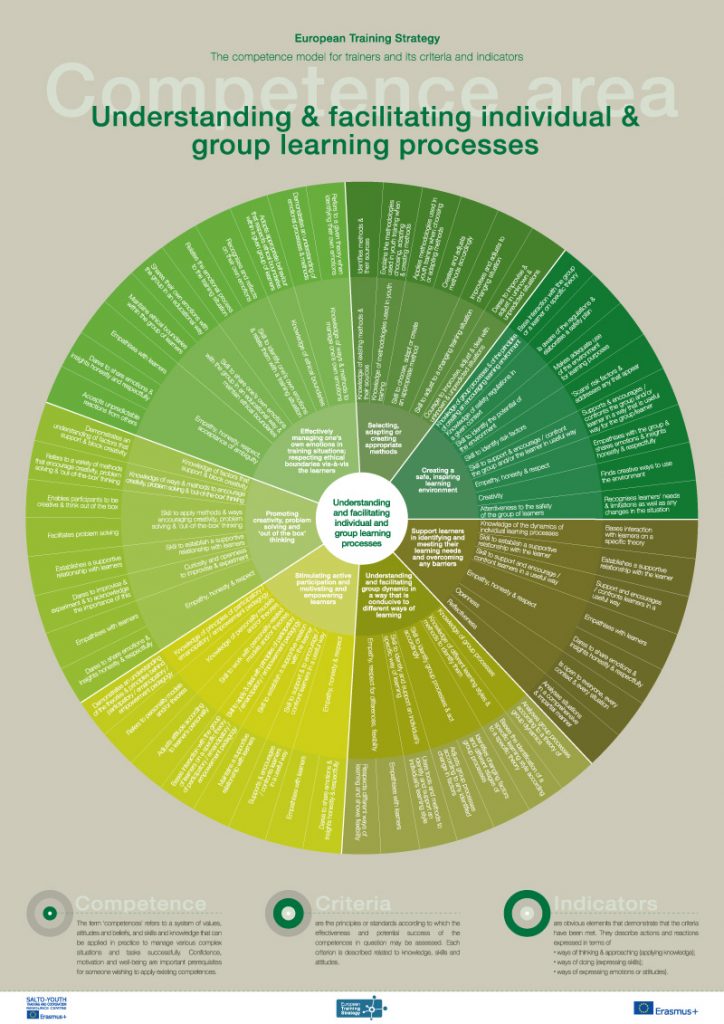Understanding and facilitating individual and group learning processes
1. Selecting, adapting or creating appropriate methods
1.1. Knowledge of existing methods and their sources
1.1.1. Identifies methods and their sources
1.2. Knowledge of methodologies used in youth
1.2.1. Explains the methodologies used in youth training when choosing, adapting and creating methods
1.3. Skill to choose, adapt or create an appropriate method
1.3.1 Applies methodologies used in youth when choosing or adapting methods
1.3.2 Creates and adjusts methods accordingly
1.4. Skill to adjust to a changing training situation
1.4.1. Improvises and adjust to changing situation
1.5. Courage to improvise, adjust and deal with unknown and unpredicted situations
1.5.1. Dares to improvise and adjust in unknown and unpredicted situations
2. Creating a safe, inspiring learning environment
2.1. Knowledge of group processes and of the principles of creating an encouraging environment
2.1.1. Base interaction with the group of a learner on a specific theory
2.2. Knowledge of safety regulations in a given context
2.2.1. Is aware of regulations and elaborates a safety plan
2.3. Skill to identify the potential of the environment
2.3.1. Makes adequate use of the environment for learning purposes
2.4. Skill to support encourage/confront the group and/or the learner in a useful way
2.5. Empathy, honesty and respect
2.5.1. Empathises with the group and shares emotions and insights honestly and respectfully
2.6. Creativity
2.6.1. Finds creative ways to use the environment
2.7. Attentiveness to the safety of the group of the learner group
2.7.1. Recognises learners’ needs and limitations as well as any changes in the situation
3. Support learners in identifying and meeting their learning needs and overcoming any barriers
3.1. Knowledge of the dynamic of the individual learning processes
3.1.1. Bases interaction with learners on the specific theory
3.2. Skill to establish a supportive relationship with the learner
3.2.1 Establishes a supportive relationship with the learner
3.3. Skill to support and encourage/confront learners in a useful way
3.3.1. Support and encourages/confronts learners in a useful way
3.4. Empathy, honestly and respect
3.4.1 Empathises with learners
3.4.2 Dares to share emotions and insights honestly and respectfully
3.5. Openness
3.5.1. Is open to everyone, every context and every situation
3.6. Reflectiveness
3.6.1. Analyses situations in a comprehensive and impartial manner
4.1. Knowledge of group processes
4.1.1. Analyses group processes according to a theory of group dynamics
4.2. Knowledge of different learning styles and methods to identify them
4.2.1. Bases the identification of a specific learning style according to a specific theory
4.3. Skill to identify group processes and act accordingly
4.3.1 Identifies changing factors and different stages of group processes
4.3.2 Adjusts group processes according to an identified change in factors
4.4. Skill to identify and support an individual’s specific way of learning
4.4.1. Uses tools and methods to identify and support an individual’s learning style
4.5. Empathy, respect for differences, flexibility
4.5.1. Empathises with learners
4.5.2. Respects different ways of learning and shows flexibility
5. Stimulating active participation and motivating and empowering learners
5.1. Empathy, honestly and respect
5.1.1. Dares to share emotions & insights honestly & respectfully
5.1.2. Empathises with learners
5.2. Skill to support and encourage/confront learners in a useful way
5.2.1. Support and encourages/confronts learners in a useful way
5.3. Skill to establish a supportive relation with the learner
5.3.1. Maintains a supportive relationship with learners
5.4. Skill to apply & deal with principles of participatory/emancipatory / empowerment pedagogy
5.5. Skill to work with personality-related models and/or theories
5.5.1. Adjusts attitude according to learner’s personality
5.6. Knowledge of personality models and / or theories
5.6.1. Refers to personality models and / or theories
5.7. Knowledge of principles of participatory/emancipatory / empowerment pedagogy
6. Promoting creativity, problem-solving and ‘out of the box’ thinking
6.1. Empathy, honestly and respect
6.1.1. Dares to share emotions & insights honestly & respectfully
6.1.2. Empathises with learners
6.2. Curiosity and openness to improvise and experiment
6.2.1. Dares to improvise and experiment & to acknowledge the importance of this
6.3. Skill to establish a supportive relationship with learners
6.3.1. Establishes a supportive relationship with learners
6.4. Skill to apply methods & ways encouraging creativity, problem-solving & ‘out-of-the-box’ thinking
6.4.1. Facilitates problem-solving
6.4.2. Enables participants to be creative & think out of the box
6.5. Knowledge of ways & methods to encourage creativity, problem-solving and ‘out-of-the-box’ thinking
6.6. Knowledge of factors that support & block creativity
6.6.1. Demonstrates an understanding of factors that support & block creativity
7.1. Empathy, honesty, respect, acceptance of ambiguity
7.1.1. Accepts unpredictable reactions from others
7.1.2. Dares to share emotions & insights honestly and respectfully
7.1.3. Empathises with learners
7.2. Skill to share one’s own emotions with the group in an educational way and way maintain ethical boundaries
7.2.1. Maintains ethical boundaries within the group of learners
7.2.2. Shares their own emotions with the group in an educational way
7.3. Skill to identify one’s own emotions & relate them with a training situation
7.3.1. Relates the emotional process to the training situation
7.3.2. Recognises and reflects on their own emotions
7.4. Knowledge of ethical boundaries
7.4.1. Adopts appropriate behaviour that respects ethical boundaries within a given group of learners
7.5. Knowledge of ways & methods to manage one’s own emotions
7.4.1. Demonstrates an understanding of emotional processes & methods
7.4.2. Refers to a given theory when identifying their own emotions
